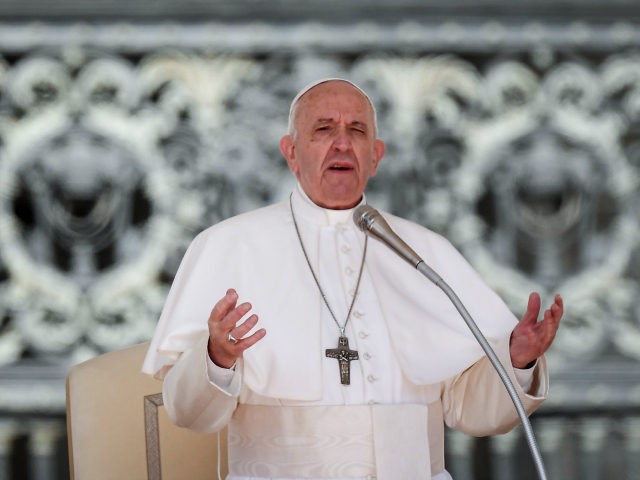Pope Francis addressed participants at a Vatican conference on Thursday and denounced a trend toward nationalism that entails “excessive demands for sovereignty.”
“The common good has become global and nations must associate,” the pope told members of the Pontifical Academy of Social Sciences who gathered for their annual meeting, entitled “Nation, State, Nation-State.”
“Unfortunately, we have before our eyes situations in which some nation states carry out their relations in a spirit of opposition rather than cooperation,” the pontiff said. Many tensions come “from an excessive demand for sovereignty on the part of States, often precisely in areas where they are no longer able to act effectively to protect the common good.”
Patriotism is a good thing, Francis said, but can become perverted when “it involves the exclusion and hatred of others, when it becomes a conflictual nationalism that builds walls, indeed even racism or anti-Semitism.”
The pope suggested that concern for national sovereignty has become deformed when countries do not have a welcoming attitude toward migrants.
“The Church observes with concern the re-emergence, in many parts of the world, of currents that are aggressive towards foreigners, especially immigrants, as well as a growing nationalism that neglects the common good,” he said.
This, in turn, “threatens to jeopardize consolidated forms of international cooperation, undermines the aims of international organizations as a space for dialogue and meeting for all countries in a spirit of mutual respect, and hinders the attainment of the sustainable development goals approved unanimously by the United Nations,” he said.
The pope went on to say that “the way in which a nation welcomes migrants reveals its vision of human dignity and of its relationship with humanity.”
“When a person or family is forced to leave their land, they must be welcomed with humanity,” he added.
“The migrant,” Francis continued, “is not a threat to the culture, customs and values of the receiving nation.”
The pontiff reiterated his belief that migration is part and parcel of human history and the formation of nations.
“All nations are the result of the integration of successive waves of people or groups of migrants and tend to be images of humanity’s diversity while being united by values, common cultural resources and healthy customs,” he said.
In the current situation of globalization, “the nation state is no longer able to procure the common good of its populations alone. The common good has become global and nations must associate for their own benefit,” he said.
Francis also pushed the idea that supranational entities should have real authority over nations to intervene in matters of great global import, such as climate change.
“When a supranational common good is clearly identified, it is necessary to have a special authority that is legally and concordantly constituted and capable of facilitating its implementation,” he said. We think of the great contemporary challenges of climate change, as well as new forms of slavery, and peace.”
In certain instances, groups of neighboring nations “can strengthen their cooperation by attributing the exercise of certain functions and services to intergovernmental institutions that manage their common interests,” he said.
Follow Thomas D. Williams on Twitter Follow @tdwilliamsrome

COMMENTS
Please let us know if you're having issues with commenting.